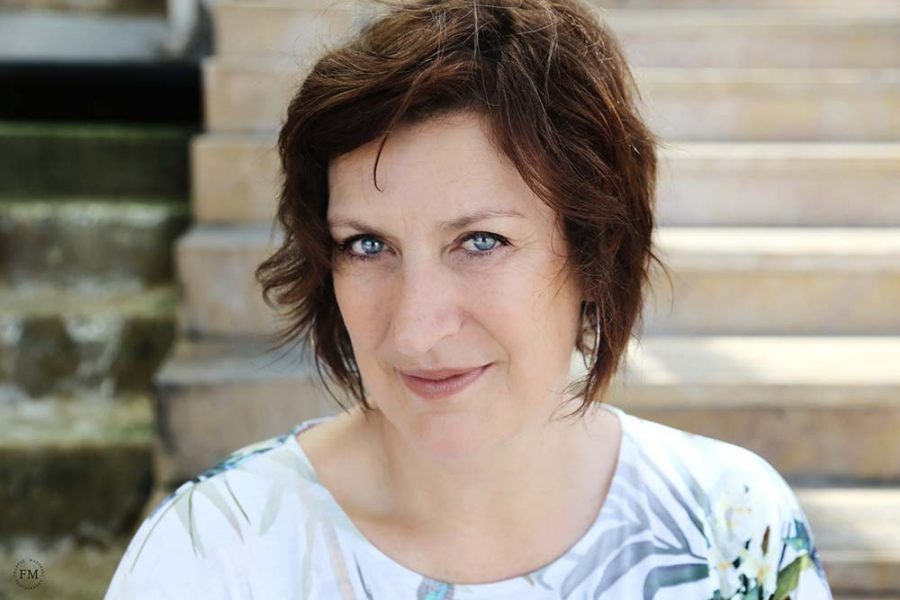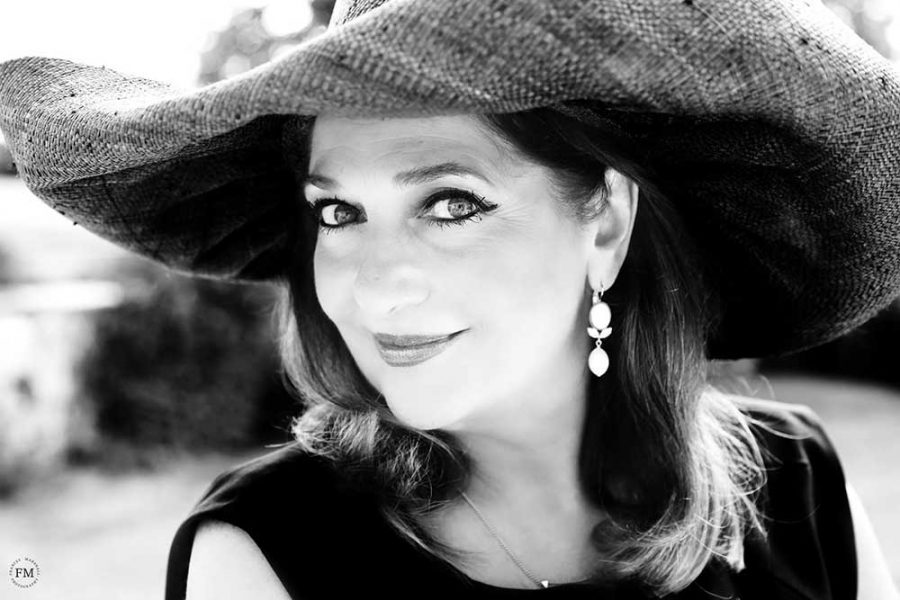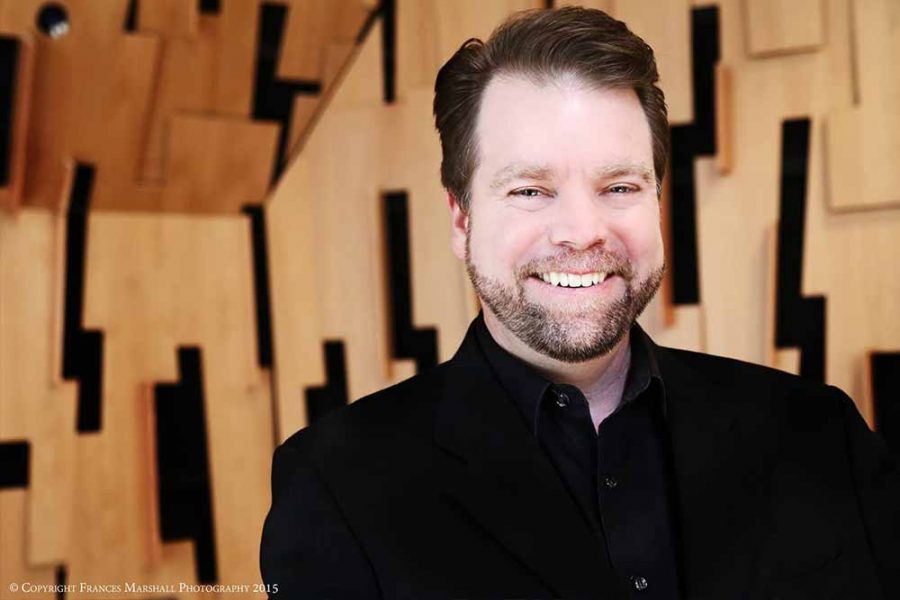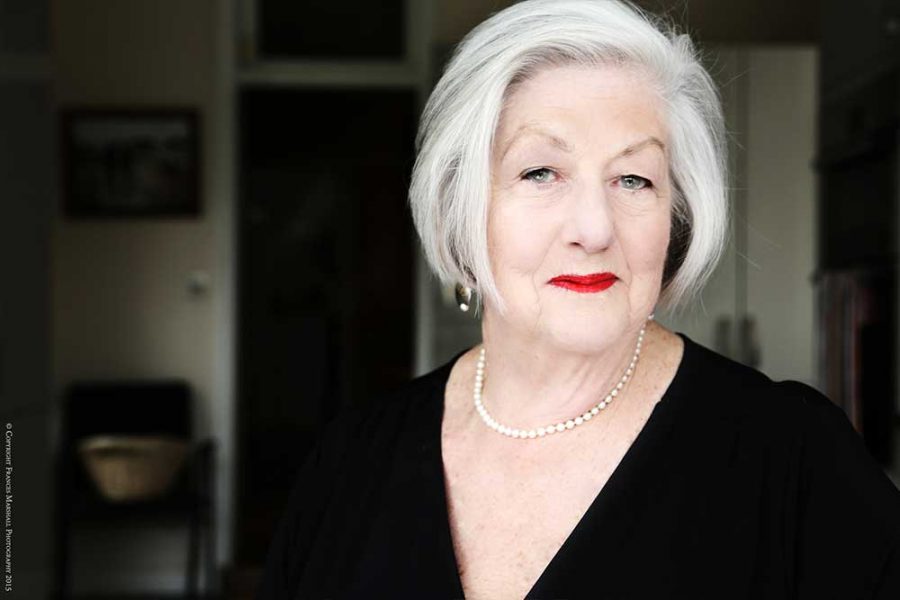From Motherwell to Manhattan, we catch up with voice teacher Gerald Martin Moore

July 2018
Interview and photos by
Frances Marshall
Edited by
Lesley Bates
Share this article
Gerald Martin Moore – voice teacher, vocal consultant and pianist – has worked with some of the biggest names in opera including renowned sopranos Renée Fleming, Marie McLaughlin and Natalie Dessay.
Brought up in Motherwell, North Lanarkshire, on a diet of Hollywood musicals and operatic scores, his career has taken him from touring Carmen to rural communities throughout Scotland to the international stages of Covent Garden, La Scala, the Metropolitan Opera and the Opera De Bastille, as well as the annual festivals at Aix-en-Provence, Edinburgh and Glyndebourne.
He has assisted musical giants of the calibre of conductors William Christie, founder of Les Arts Florissants, and Sir Charles Mackerras, and composed embellishments for leading singers, notably in his role as vocal consultant to Opera Rara and Decca.
He is a frequent recitalist, and has performed before presidents and royalty. As an authority on vocal technique, he regularly guests on radio programmes, and is also in demand as a judge of prestigious singing competitions and a regular host of the metropolitan Opera Radio quiz.
He and soprano Rebecca Caine collaborated on a cabaret evening and album, entitled Leading Ladies, dedicated to the legendary stars of British musical theatre, of which he remains a great fan.
Final Note caught up with Gerald in his opulent Versailles-inspired Manhattan apartment.
If you don’t have the ears to hear the really fine tuning, you’re never going to be at the very top."

So how does a boy from a non musical family in a small town in Scotland end up teaching the finest artists of the operatic industry?
As a child, we visited family friends of my parents on the way home from mass and, apparently, I could pick out the hymn tunes we’d just heard on the piano when I was about four. That led to people advising my parents to send me to piano lessons. So they stuck a piano in the garage and sent me to a wonderful local lady for piano lessons.
Otherwise, I had the usual misspent childhood of many people of my generation growing up in Motherwell. I was left to my own devices and, as I loathed sports, I was either sitting in front of a TV or in the cinema, or the local library the whole time. I loved Kathryn Grayson, Jeanette MacDonald and Deanna Durbin. I was always drawn to musicals and that style of singing. It had a charm and fascination for me.
What does it take to make a really great singer?
There are many components, but I do find that good ears are absolutely essential. If you don’t have the ears to hear the really fine tuning, you’re never going to be at the very top. Renée Fleming and Marie McLaughlin have two of the best sets of ears of any singers I’ve ever worked with in over 30 years. Some singers are more cerebral, and others slightly more athletic and muscular. As an example, I would surmise that a singer like Pavarotti treated his singing more as an athletic activity than a cerebral one. In other words, I think he used his ears and his sensations to build his technique, rather than a verbalized pedagogy. Every singer has to find the way that suits them best.
Renée Fleming has referred to you as ‘her ears’, is there anything a singer can do to develop this asset or is it a gift you’re born with?
It’s a combination of both. You can be born with the most amazing instrument ever, but if you don’t have the ability to hone or develop it, it’s not going to get you as far. You could also be born with a less impressive instrument, but if you can control what you do with it and create a fabulous range of colours, and have personality on stage you can have a great career.
The ear can be trained too… I think I must have good ears, but as a teenager I started to develop a more astute awareness, thanks to my relationship with Marie McLaughlin. We would listen to singers together and often she would point out something I had initially missed in my excitement over the emotion of the singing, and then I would listen again until I heard what she had picked up. It was a great lesson not to let your emotions dull your ears. When I’m teaching singers, I recognize the same pattern. They come in full of admiration for these stars and often if I point out flaws in the singer they’re listening to, they’re sort of crushed at the beginning, but then they listen again and they’ll say ‘I hear what you mean’. I tell them that I’m not doing this to be mean, I’m showing them that every great singer has strengths and weaknesses. It is the difference between achieving A plus quality singing or ordinary.
Your friendship with Marie McLaughlin is well known, how did you meet?
I was lucky enough to meet Marie when I was still a teenager and she was just beginning her career. She was local and had been searching for someone to help her with the rep she was learning. She wanted it prepared to a high standard, and although, locally, there were some really good pianists, none were operatically inclined. She heard about me and we met, and it was when we worked together that I realised the level she was aspiring to, and was already on her way there. Mostly, at that time in your life, you’re listening to college or local level, but I was able to see that this was Covent Garden/Glyndebourne level. It made me realise the preparation and work that you really need to do if you want to get to the top. Nowadays, we speak to each other virtually every day; I consider her family.

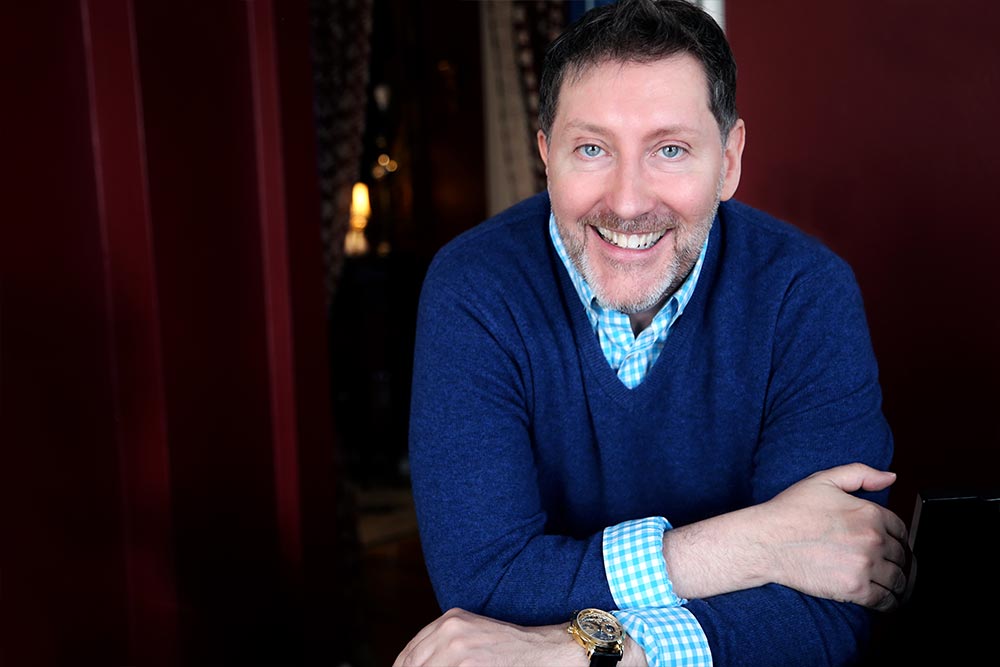


My passion is really for voice technique and trying to help people to fix issues."

You’ve worked with so many of the world’s leading operatic artists: what was the pivotal moment that led you to working with the top opera singers in the industry?
It was a gradual development of many things. Thanks to Marie, I got to work with certain singers like Ileana Cotrubas when I was in my 20s. There wasn’t an exact moment, but when William Christie engaged me to go to Aix-en-Provence in the mid 90s to prepare The Magic Flute, I think things started to move to a different level. I was no longer a répétiteur/coach, I was working on what was for me the next level.
It was there that I met and worked with Natalie Dessay in 1994 (her first Queen of the Night). She subsequently took me to La Scala (Sonnambula) and we worked on several of her recordings together. Sir Charles Mackerras was another great working relationship that contributed to my progress. Then I assisted Bill Christie on Alcina at the Palais Garnier where I met Renée in 1999. We began a strong working relationship, and she started flying me over and back from the UK for openings and recordings – and eventually was instrumental in my decision to move to NYC.
Was she your main reason to move to New York?
She probably was the catalyst. I had come to New York with William Christie in the 90s for Orlando performances and I remember it clearly because the city was in a snow storm and it was stunning. New York was a city that lived up to all the hype I expected from the movies. I remember flying into Manhattan and everything looked exactly how I expected it to look, the Empire State Building and Statue of Liberty. A walk through snow-covered Central Park and I was in love with New York.
I know it’s a generalisation, but my experience was that the attitude was more positive and the work ethic stronger than I found it to be in the UK. Obviously, there’s a bigger pool of talent in the US because of the sheer size of the place, but I felt that my style of teaching worked well with American singers. There’s something instilled in them that the harder they work, the more successful they’re going to be. The way I like to teach seemed to resonate well with them.
I’ve repeatedly heard you referred to as a vocal coach instead of a voice teacher, how do you differentiate?
Well, it’s not entirely a mistake. I think it’s more important in the States to differentiate between the two. And for the first ten years of my career, I would not have called myself a voice teacher because I didn’t have enough experience of vocal technique.
I noticed I couldn’t get what I wanted from singers as a coach because they had technical issues. I used to discuss this a lot with Marie and I went to study with her teacher for a while and then to other voice teachers. A lot of them have things to offer, but function as coaches who pass on experience of their own careers, which is useful to a degree. But to construct a technique from scratch, I think it’s important to have more information to reference than simply what worked for your own instrument or personality.
I came to New York to work with Renée Fleming’s teacher for a little bit, and then worked with some doctors in voice clinics, who had worked with people with damaged voice and I really got a lot more answers when I did that. So in my early thirties, I decided to stop being a coach and concentrate on being a voice teacher. However, I do still coach some of the speciality repertoire, which I love, and which goes hand in hand with the technique. My passion is really for voice technique and trying to help people to fix issues.
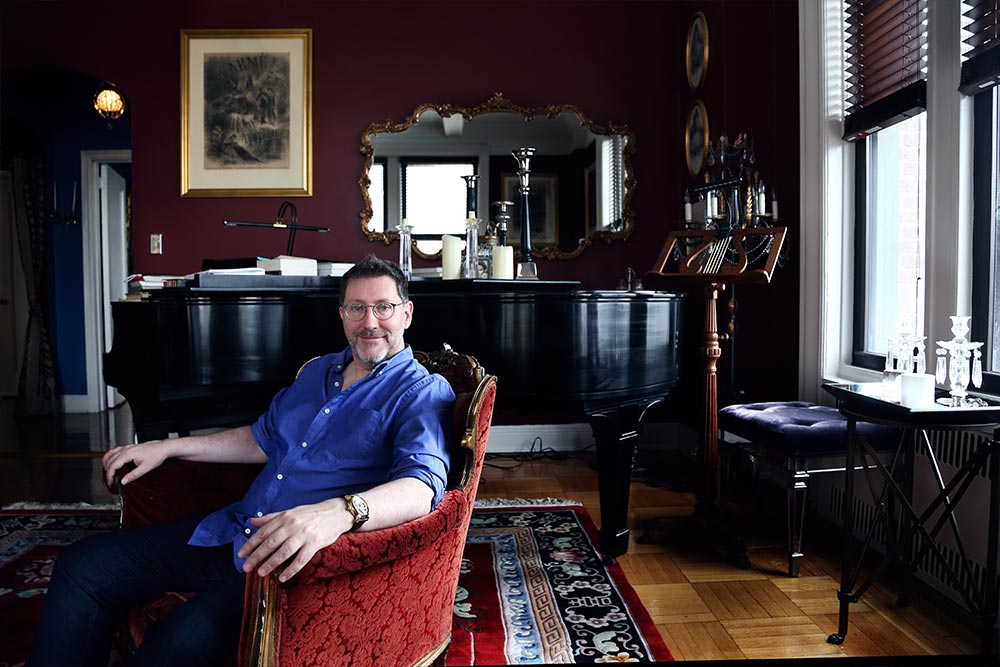


Then in addition to this, you also work as a vocal consultant for companies such as Opera Rara and Decca. How did this come about and how did this differentiate from what you were already doing?
It’s the same thing really. The difference between a voice teacher and a voice consultant is slight. For example, when I work with an opera company as a vocal consultant, they often choose that title over voice teacher because it suggests I am there only if anyone wishes to be consulted – ie professional singers might want a little help with certain things, but would not necessarily need a series of voice lessons.
Another of my specialities is ornament and cadenza writing. Some singers are really gifted and they can improvise their own, like Jennifer Larmore or Sarah Connolly. Then there are singers who are maybe not so familiar with the style and who need some help. I worked with Sir Charles Mackerras and he was fastidious about what ornaments he wanted in advance. He would give them to the singer and they wouldn’t sound so great because they didn’t suit their individual instruments. My role would be to be in the middle and tailor it so we could work out a compromise to keep him happy and also the singer.
There’s so many layers in the work that you do, it’s an incredible job…
That’s what makes it interesting. When I’m a vocal consultant and when I’m on a project with Sir Charles or with William Christie, you have to be tactful and careful with the notes that you give singers and how you go about that. You certainly don’t want to be giving singers notes on technical issues unless you’re invited, that’s why the term consultant was there.
Tell me about working on a jury for a competition. What are you looking for, how do you decide, what’s the biggest mistake singers make?
Everyone looks for the total package, that star quality that really makes you sit up and pay attention. When you don’t have an abundance of them in the competition, you then prioritise what’s most important for awarding a prize. Do you award someone who’s unfinished, but the actual potential is phenomenal. Or do you look at someone who isn’t the greatest instrument in the whole world, but they have so much to offer by way of stage craft and musicianship. Are they compelling? Often I will pick up on some intonation or technical thing that bugs me, whereas another juror will be more impressed by another aspect, that they didn’t notice or care so much about that. Then the arguments start. The biggest mistake singers make, certainly in America, is trying to please and thinking about what they should be doing to fit into what the jury is looking for. I would love a singer not be afraid to be distinctive, own their repertoire – it’s better to be divisive than bland. Yes, of course you have to respond well to your coaching, but you need to know when to bring something of yourself to this. You have to know when to break these rules now and again – every great singer does.
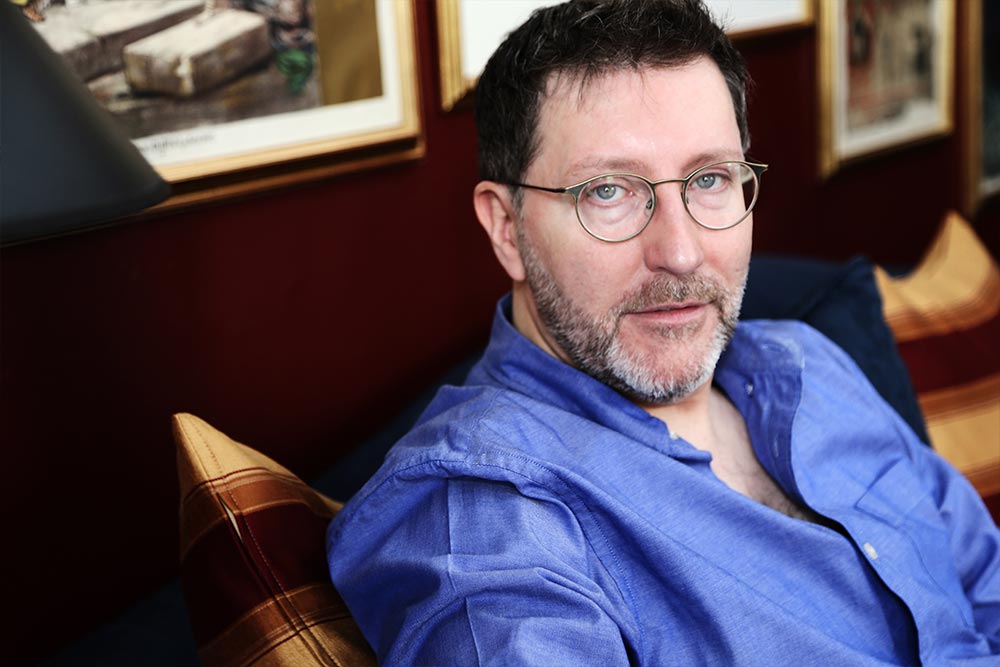

Speaking of breaking the rules, many classical artists have crossed over to other genres and have received criticism. Where do you stand on this?
When you push boundaries you’re taking a risk and I’m not saying that everything is going to be 100% successful, but I think the singer should be allowed to do whatever they want. Pop and jazz songs, many are covers that have been sung by all types of singers, but we tend to always think about who performed it the first time we fell in love with the song.
I definitely feel if you’re personally attached to a particular singer performing a particular piece, it’s difficult to hear another interpretation, but that doesn’t mean you should forbid them. When Renée produced her jazz album Haunted Heart, there was a lot of criticism that came out from classical critics. I decided to ask some singers, who were very critical, what they thought of this jazz singer, without mentioning who it was, and they all said: ‘Oh she’s fantastic – who is it?’
Tell me about your time working with Kelli O’Hara.
What’s interesting about Kelli is that many thought it was this huge revelation that she could suddenly sing opera. When no, she was trained this way. Then she chose to take the musical theatre route. What’s important is that she’s being recognised for singing Despina at the Met. It was fantastic and on a par with any other performance on that stage – I’m delighted about that. However, I always find it funny when opera singers say that if the opera doesn’t work out, they can always do musical theatre. It just makes me laugh because musical theatre, in many ways, is almost harder, or at least presents a different set of difficulties/skills. The standard is higher for how you’re supposed to look, act, deliver dialogue and be able to dance, while also having the stamina to do eight shows a week in lots of different styles. You don’t sing Carousel in the same way that you sing Les Mis, Frozen or Kiss Me Kate. It’s nonsense and snobbery about classical as opposed to Broadway and I’ve no time for it. I think some of Richard Rodgers’ music is worthy of Puccini. Musical theatre was my first love, before I discovered opera, and I’ve always loved both styles.
I know it will be difficult for you to list your career highlights because I’m sure you’ve many memorable moments, but what springs to mind?
It divides into two categories roughly, the first being things you are proud of because of the prestige attached to them, and then there’s the ones that you just had the best time ever – it’s rare that they combine equally. The very first recital tour I did with Renée was a huge honour, but I must admit I was nervous – the pressure of not letting down a great artist is real. Definitely the Alcina in the Bastille with Bill Christie, Renée and Natalie Dessay, when they were all at the height of their powers. Going to La Scala in the 90s with Natalie Dessay, Salzburg Festival with Marie in the 80s – those are some of the highlights. I also enjoyed working with Julianne Moore for the movie that’s coming out shortly called Bel Canto. Renée and I recorded the soundtrack and Julianne lip-syncs the role in the movie.
Coming from a dysfunctional family, the idea of this perfect mother/governess figure coming in to fix them all through the power of singing… I think this really had a profound effect on me."

How did you find going from working with singers 24/7 to working with a phenomenally famous actress?
To see Julianne Moore, who I’ve always admired from afar as an actress, and then, suddenly, she’s in my front room, wearing a baseball cap, no make-up, and still looking absolutely gorgeous, was sort of surreal. They are the great perks and excitements that come with the job, for which I am grateful, and it’s interesting to observe what makes a star in many ways. You see the absolute sheer dedication to the work. They’re intently focussed and professional. They know not to waste their energy on the wrong things.
Tell us about your admiration for Julie Andrews…
I know it’s very cliché in one sense to say The Sound of Music changed my life, but…
I saw it when I was four in the old Gaumont cinema on Sauchiehall Street in Glasgow, in the days when cinemas had a balcony like a theatre, so I sat on the steps and apparently I couldn’t be moved even through the intermission…
Coming from a dysfunctional family, the idea of this perfect mother/governess figure coming in to fix them all through the power of singing… I think this really had a profound effect on me. And I would think: wouldn’t this be an amazing thing to have this whole family united through music and singing. I also loved her singing and I loved her diction. Even now when I hear the opening lines of the movie, it stirs a visceral response in me that makes me feel comforted.
What’s interesting about The Sound of Music movie is that it was thrashed by the critics, but the public ignored them because it conveys a message that everyone wants to hear… It sounds really corny to say this, but this idea that you have to climb every mountain until you get your heart’s desire was, I’m sure, very influential in making me pursue what I wanted to for a living despite it being not the easiest job to do. But the idea that I just had to do it came largely from the inspiration of watching those movies.
Have you had a chance a to meet Julie Andrews?
I’ve not met her in person, I think she’s the one big diva of my childhood and teenage years that I haven’t and she’s probably the only one that I might find it difficult to cope with. I corresponded with her through her first husband Tony Walton, I did a tribute album to leading ladies of the musical theatre with Rebecca Caine and we dedicated a large section of it to Julie Andrews. She was really the last classically trained soprano to sing in musical theatre, then taste changed so much after that. When Streisand came along, it changed a lot of taste in musical theatre and Julie’s style of singing became very quickly passé.
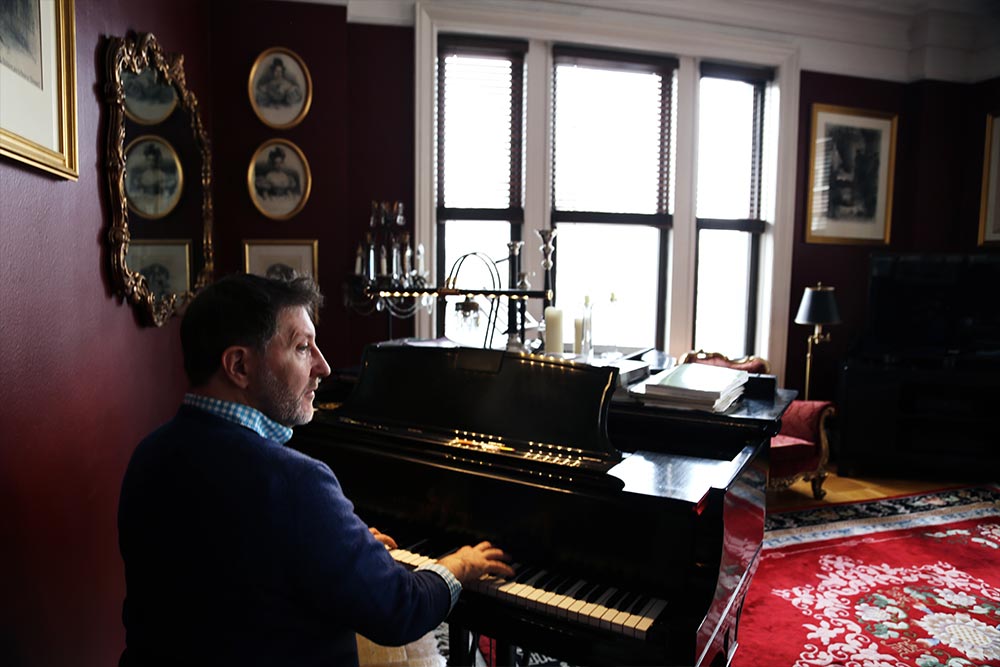

You started very young in this area of vocal teaching and coaching, as young as a teen, how does a teenager get to that level?
I think it’s to do with determination and passion, plus the fact that I tend to be slightly obsessive. I’d rather be good at a small amount of things rather than an all rounder, which is why I do so little. I was also a good sight reader, a skill I think I developed from starting so young.
But I never had the passion to practice piano for hours a day, which I would do when it came to singing. The Motherwell library back then had the most incredible resources. Here was this teenager from the age of 12 going in and ordering these obscure bel canto scores, musical theatre and operetta. I was ordering Lakmé, Anna Bolena, and the library bought everything you requested. What I used to do was read the scores and sing them at the same time, all day, every day. I was a precocious boy soprano, but I never sang traditional boy soprano repertoire, I sang all the coloratura stuff that I loved from all the divas… and that’s how I got to know all the repertoire.
So many students come to you for consultation privately in New York for guidance on specific issues. Are you fearful of stepping on the toes of their teacher and how far do you go?
As far as stepping on toes, I firmly believe the singer is responsible for their voice, their technique and their career. There are few, if any, successful singers that I know that have had only one input from one teacher. An inquisitive singer will always ask if they hear something they like, they’ll hear information that may be contradictory or different and will investigate, taking what will help them, I try to work from where they are with their current/previous teacher; I feel if you give the information, it’s up to the singer to decide whether they want to pursue that or not.
I rarely encounter anyone who has to realign everything from the beginning. On the rare occasion where I think they do, you have to be very careful how you put that because you can’t undermine a singers confidence in mid-career.
When it comes to the safe space in your teaching room, the singer is relaxed and comfortable, then they go out on stage and suddenly the adrenaline hits – there’s going to be things that come up in the technique that don’t happen in a lesson. How do you balance this?
A good teacher always is aware of the extra tensions and pressures that will appear in performance situation as opposed to a lesson. This is why I will go and watch singers in rehearsals to give notes because then I see issues that don’t always appear in their lessons. To prepare them I always slow down the tempo, try the phrase slower and faster than their comfort zone – after all the Maestro might want a different speed. The same with range, I try to vocalise them a little higher and lower than they have to sing in public, so that they’re prepared for all eventualities, with nerves and adrenaline too.
What’s next for you?
I’m really happy to be home for a bit. I’ve just finished a bunch of recitals with Renée, and now I’m off to teach in Santa Barbara, followed by some masterclasses in the Lyric Chicago Young Artists programme, and then off to Ravinia to teach in the song festival there. And in between that, I’m home teaching, which makes me very happy. The fall brings more Recitals and also hosting the Met Radio quiz, which is great fun.
All images displayed in this article are subject to copyright.
Share this article


